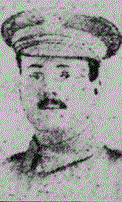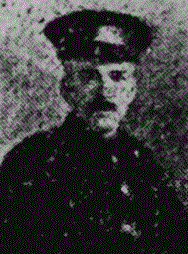Yorkshire Post and Leeds Intelligencer – From the War
A Liverpool Mans Request – A clause in the will of Mr. W. S. Marvel, a provision broker, of Liverpool, requests that on his decease his remains “shall not in any way be interfered with, neither washed nor re-clothed, but shall be conveyed in an inexpensive case or casket to the nearest crematorium, and there burned, the ashes being thrown away,” and that “there shall be no funeral ceremony or religious service, and no outward showing of mourning, either of the wearing of mourning by his relatives or the pulling down of blinds, or anything of that character.” The deceased left £11,627.

Pte. Edmund Leatherbarrow
Casualties to Yorkshiremen in various units. – Pte. Edmund Leatherbarrow, of the Liverpool Pals, was killed in action on July 1. He was the eldest son of Mr. and Mrs. J Leatherbarrow of Ryecroft, Lidgett Lane, Roundhay, and was in business in Liverpool. His youngest brother, L. Corpl. W Leatherbarrow, Yorkshire Regt., was killed in action in the Dardanelles last August. (see top photograph)
Pte. J. W. Blanshard, Duke of Wellington’s Regiment, killed in action on July 7. His home is at 29 Lodge Avenue, New Wortley, Leeds. He leaves a widow and four children.

Pte. J. W. Blanshard
Private Percy Rhodes, West Yorks, the son of Mr. William Rhodes, 15 Milner Street, Hunslet, died of wounds in the General Hospital, Havre, France, on July 12th. He was 18 years of age
A Goods Guard’s Sudden Temptation – At Wakefield today, Henry Hemingway, a goods guard, in the employ of the Lancashire and Yorkshire Railway Company, was fined £5, or one month’s imprisonment, for stealing a bottle of brandy from the goods yard at Kirkgate Station. He said he committed the theft under sudden temptation.
Mrs. Mary Wheatley, of New Market House, Adwalton left £3000 in her will.
How our wounded were dealt with on the Somme – One of the most gratifying features of the operations on the Somme has been the splendid work of the medical units.
On the fourth day of the battle the Commander-in-Chief issued the following order of the day, addressed from Advanced General Headquarters to the deputy directors of medical services, and by them sent on to all medical units with instructions that it should be read on parade :- “The Commander-in-Chief directs me to convey to you, and through you to the directors and all concerned under them, his high appreciation of their hard work and the efficiency of arrangements for dealing with the medical aspects of the present situations”.
It seems certain (says the British Medical Journal), that the proportion of light to serious cases has been unusually large, while even among the more severe the prognosis is regarded as more hopeful than usual. The reason would seem to be that the enemy depended for the most part on machine rifle fire in their endeavours to repel the attack, and rifle bullet wounds, if they do not cause immediate death, tend on the whole to heal more quickly than those caused by high explosive and other shells.
The rate of evacuation from the front to the bases was so considerable that by the end of the fourth day – that is to say, within a few hours of the end of the initial battle – most of the casualty clearing stations and field ambulances seem to have had very few patients left on their hands. The great majority had already been put on many of them the ambulance trains or otherwise safely removed to a distance from the scene of action, and they were in hospitals at home.
The staffs of most of the units named had previously been strengthened by sending to them men who for the time being could be spared from their ordinary duties elsewhere. For the most part they were all medical officers who had had previous experience of the same kind of work either as battalion medical officers, field ambulance officers, or members of the staffs of casualty clearing stations. Some previous experience is very desirable, for the work that has to be done at front line formations during the progress of heavy duty actions is quite special in its character. The number of casualty clearing stations distributed within easy reach of the part of the line at which the operations were most active, was, we believe, considerably above the usual proportions. As a rule, they were arranged in pairs with the idea of allowing one of the two to have time to deal with the cases already taken in, while the other was open for the admission of fresh cases. They emptied and filled alternately.
This was one strong feature in the arrangements; another was the care taken to provide for the prompt classification of cases. From the fighting line backwards the cases were winnowed and re-winnowed, men being sent to one place or another according as the apparent gravity of their wounds or their general condition seemed to demand. In addition, for instance, to the casualty clearing station, there were also places to which those who were only slightly wounded could be sent and receive immediate treatment, as well as medical rest houses, some for officers, some for men, to which could be sent those who were not wounded but only temporarily exhausted from their exertions.